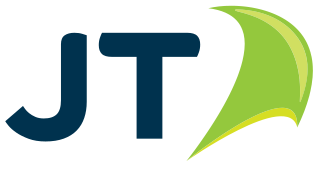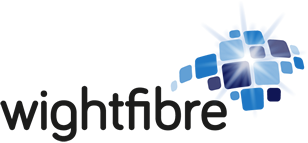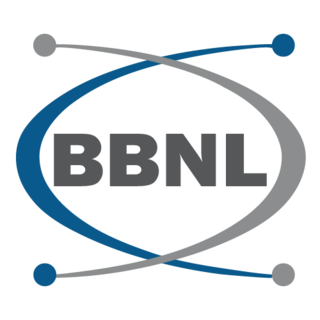India's telecommunication network is the second largest in the world by number of telephone users with over 1.1 billion subscribers as of December 2023. It has one of the lowest call tariffs in the world enabled by multiple large-scale telecom operators and the ensuant hyper-competition between them. India has the world's second largest Internet user-base with over 904 million broadband internet subscribers as of December 2023.
Telecommunications in Lithuania include internet, radio, television, and telephony.

JT Group Limited is the parent company of several subsidiaries including Jersey Telecom Limited and Wave Telecom Limited. Jersey Telecom is the former monopoly operator in the Bailiwick of Jersey. JT provides telecommunications, Internet access and other services, mostly within the Channel Islands.
Municipal broadband is broadband Internet access offered by public entities. Services are often provided either fully or partially by local governments to residents within certain areas or jurisdictions. Common connection technologies include unlicensed wireless, licensed wireless, and fiber-optic cable. Many cities that previously deployed Wi-Fi based solutions, like Comcast and Charter Spectrum, are switching to municipal broadband. Municipal fiber-to-the-home networks are becoming more prominent because of increased demand for modern audio and video applications, which are increasing bandwidth requirements by 40% per year. The purpose of municipal broadband is to provide internet access to those who cannot afford internet from internet service providers and local governments are increasingly investing in said services for their communities.

WightFibre is a full-fibre network operator on the Isle of Wight. WightFibre provides telephone and broadband internet services exclusively to homes and businesses on the Isle of Wight.
Internet access is widely available in New Zealand, with 94% of New Zealanders having access to the internet as of January 2021. It first became accessible to university students in the country in 1989. As of June 2018, there are 1,867,000 broadband connections, of which 1,524,000 are residential and 361,000 are business or government.
Since its beginnings in 1995, the Internet in Malaysia has become the main platform for free discussion in the country's otherwise tightly controlled media environment. As of Q1 2017, Malaysia had broadband penetration rates of 103.6% and 81.8%.

The Internet in the United States grew out of the ARPANET, a network sponsored by the Advanced Research Projects Agency of the U.S. Department of Defense during the 1960s. The Internet in the United States of America in turn provided the foundation for the worldwide Internet of today.

Internet usage in Ireland was reported at a 95% rate among individuals by 2022, higher than the European Union (EU) average of 89%. According to the European Commission's Digital Economy and Society Index (DESI) 2023 report, 70% of Irish adults had at least basic digital skills in 2021, above the EU average of 54%. Additionally, 77% demonstrated basic digital content creation skills, exceeding the EU average of 66%. Ireland's National Digital Strategy, along with the 10-year Adult Literacy for Life strategy, aims to enhance digital competencies across the workforce and society.
Internet in Malta plays a key role in enhancing the nation's digital infrastructure and public services.
The Internet in Croatia became a reality in November 1992 when the first international connection linking Zagreb and Vienna became operational.

The term "Internet in Poland" refers to various aspects related to the state of the Internet in the Republic of Poland. This encompasses issues such as Internet access, governance, freedom, and infrastructure, as well as social, economic, and political factors that contribute to the digital landscape in Poland.
Broadband Internet in Israel has been available since the late 1990s in theory, but it only became practically accessible to most customers in 2001. By 2008, Israel had become one of the few countries with developed broadband capabilities across two types of infrastructure—cable and DSL—reaching over 95% of the population. Actual broadband market penetration stands at 77%, ranked 7th in the world. In 2010, Israel was ranked 26th in The Economist's Digital Economy Rankings. In 2022, Israel was ranked first for digital quality of life by Surfshark.
The Economist Intelligence Unit (EIU) is the research and analysis division of the Economist Group, providing forecasting and advisory services through research and analysis, such as monthly country reports, five-year country economic forecasts, country risk service reports, and industry reports. The EIU provides country, industry, and management analysis worldwide and incorporates the former Business International Corporation, a UK company acquired by its parent company in 1986. The EIU has its main offices in four cities—London, New York, Hong Kong and Dubai.

Broadband is a term normally considered to be synonymous with a high-speed connection to the internet. Suitability for certain applications, or technically a certain quality of service, is often assumed. For instance, low round trip delay would normally be assumed to be well under 150ms and suitable for Voice over IP, online gaming, financial trading especially arbitrage, virtual private networks and other latency-sensitive applications. This would rule out satellite Internet as inherently high-latency. In some applications, utility-grade reliability or security are often also assumed or defined as requirements. There is no single definition of broadband and official plans may refer to any or none of these criteria.
Connecting America: The National Broadband Plan is a Federal Communications Commission (FCC) plan to improve Internet access in the United States. The FCC was directed to create the plan by the American Recovery and Reinvestment Act of 2009, and unveiled its plan on March 16, 2010.
The Broadband Commission for Sustainable Development was established in May 2010 as a joint initiative by the International Telecommunication Union (ITU) and the United Nations Educational, Scientific and Cultural Organization (UNESCO) to promote Internet access, in particular, broadband networks in order to help achieve United Nations development goals, such as the Millennium Development Goals. The Commission was renamed the Broadband Commission for Sustainable Development, following the adoption of the UN's Sustainable Development Goals in September 2015.
Broadband universal service, also known as universal service obligation (USO) or universal broadband service, refers to government efforts to ensure all citizens have access to the internet. Universal voice service obligations have been expanded to include broadband service obligations in Switzerland, Finland, Spain and the UK.
The following are international rankings of Israel:

BharatNet, also known as Bharat Broadband Network Limited (BBNL), is a central public sector undertaking, set up by the Department of Telecommunications, a department under the Ministry of Communications of the Government of India for the establishment, management, and operation of the National Optical Fibre Network to provide a minimum of 100 Mbit/s broadband connectivity to all 250,000-gram panchayats in the country, covering nearly 625,000 villages, by improving the middle layer of nation-wide broadband internet in India to achieve the goal of Digital India.




